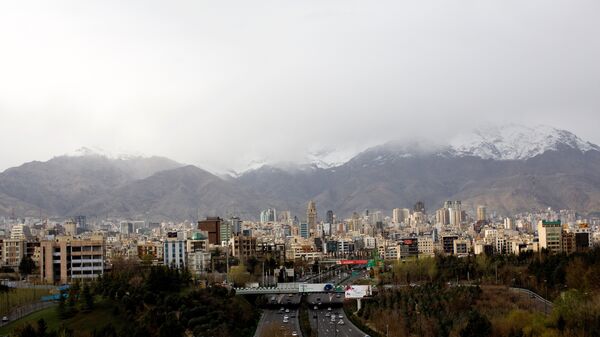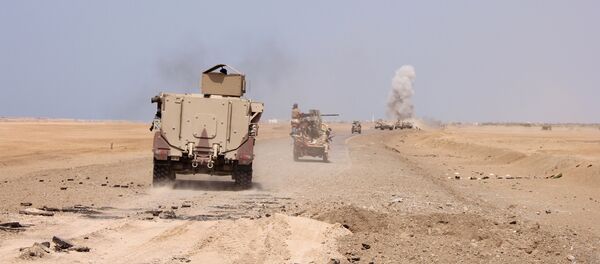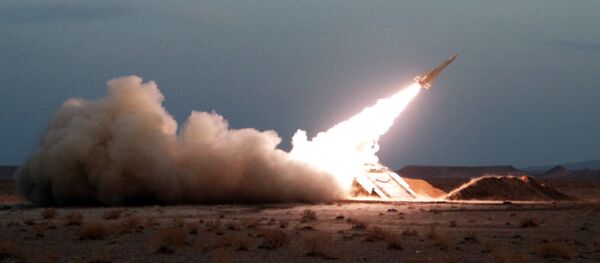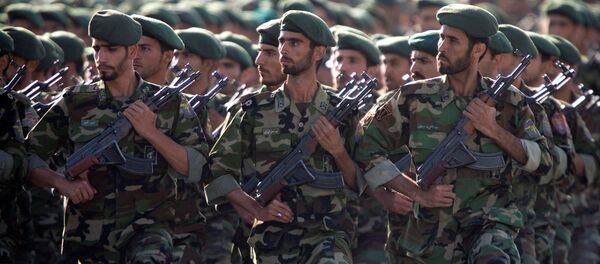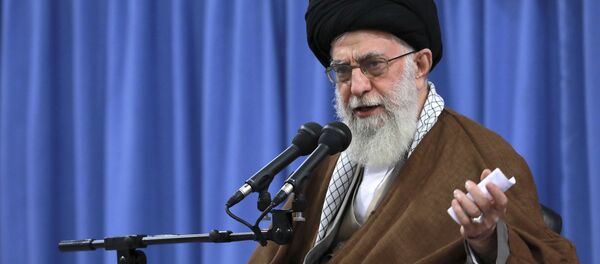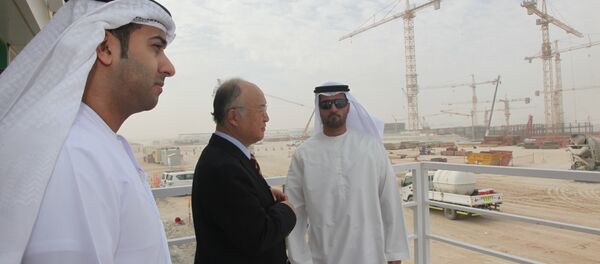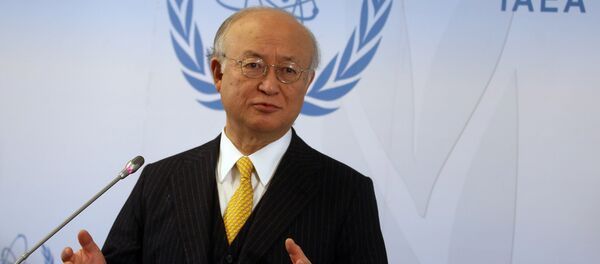MOSCOW (Sputnik) — The last year saw many controversial steps taken by the administration of US President Donald Trump, but the harsh policy on Iran, including the introduction of new sanctions against Tehran over its ballistic missile program and refusal to certify Iran’s compliance with the nuclear deal, formally known as the Joint Comprehensive Plan of Action (JCPOA), are among the most notable issues worth reflecting upon.
Trump’s policy on Iran created uncertainty and anxiety among the international community, which fears that the US president may follow through on his threats to scrap the deal signed in July 2015 by Iran, the European Union and the P5+1 group of nations comprising the United States, Russia, China, France and the United Kingdom plus Germany after 20 months of difficult negotiations.
New Rounds of Sanctions
The agreement stipulating the gradual cancellation of the sanctions in exchange for Tehran abandoning its nuclear program did not stop the US administration from toughening the restrictions it imposed on Iran as in August Trump enacted new sanctions against the country over its missile program. According to the Countering America's Adversaries Through Sanctions Act, any individuals who are engaged in or support in any way the Iranian government’s ballistic missile program and other programs related to weapons of mass destruction that “directly threaten the United States and key allies in the Middle East, North Africa, and beyond,” should have their property seized, visas denied, or even be expelled by Washington.
READ MORE: Iran Nuclear Deal: Why EU Unlikely to Follow in Washington's Footsteps
The move was widely criticized by senior Iranian officials, who claimed that the US law had violated the provisions of the JCPOA which were signed in July 2015 by Iran, the European Union and the P5+1 group of nations comprising the United States, Russia, China, France and the United Kingdom plus Germany. Iranian President Hassan Rouhani had even warned that Tehran might pull out from the nuclear deal “within days or hours” if the United States continued its hostile policy, accusing Washington of being "neither a good partner nor a reliable negotiating party.” US officials have argued that sanctions were not related to the country’s nuclear program and therefore did not violate the deal.
Trump made the US relations with Iran even tenser by announcing on October 13 more sanctions against entities related to the ballistic missile program and the IRGC. Trump's move prompted an immediate response from Tehran, with its Foreign Ministry warning that it would have “a consistent and harsh reaction” to the measures against the IRGC. Furthermore, the Iranian military vowed to speed up the development of the country’s missile program.
The next month the US Treasury Department expanded the sanctions against Tehran even further, imposing restrictions on the IRGS-related Aerospace Force Self Sufficiency Jihad Organization, Air Force, Al-Ghadir Missile Command, and Research and Self-Sufficiency Jihad Organization.
Trump Decertifies Tehran's Compliance With JCPOA
Even during his election campaign, Trump labeled the JCPOA as "the worst deal ever negotiated." Since assuming the office in January, he had repeatedly slammed Iran for alleged non-compliance with the deal and threatened to pull out from the agreement which was actively promoted by his predecessor Barack Obama and led to the removal of all nuclear-related US sanctions against Tehran.
READ MORE: 'Young, Inexperienced': IRGC Slams Macron Over Idea to Review Missile Program
On September 19, Trump addressed the UN General Assembly on various international issues, including the nuclear deal with Iran and Tehran’s policy in the Middle East. The US president accused the Iranian authorities of funding terrorism, backing Syrian President Bashar Assad’s “dictatorship” and fueling the war in Yemen. Trump also stated that the nuclear deal served as a disguise for Iran’s nuclear program and called the deal itself an “embarrassment” to the United States.
Next day, the foreign ministers of all signatory states convened the meeting of the Joint Commission on the deal’s implementation. US Secretary of State Rex Tillerson explained to his counterparts that the Obama administration implemented the deal through the executive order without congressional ratification, and therefore the United States was seeking to renegotiate the terms of the agreement so that it satisfied the incumbent president and the US citizens. He also confirmed that Trump had decided on whether to walk away from the deal, which prompted concerns about the US potential withdrawal.
After the meeting, EU foreign policy chief Frederica Mogherini noted that the deal “belongs to the international community,” and therefore was not subject to unilateral re-negotiation. She stressed that the world was already facing one nuclear crisis in North Kora and there was no “need to go into a second one.”
On October 13, apart from announcing fresh sanctions, Trump stated that his administration had decided not to re-certify Iran's compliance with the JCPOA. He added that the White House would work with Congress and its allies abroad to fix "many serious flaws" of the agreement, in particular replacing temporary restrictions on Iran’s nuclear program with permanent ones, and threatened to otherwise unilaterally terminate the deal. The US president citied Iran’s alleged non-compliance with the deal, referring to the fact that Iran had exceeded agreed-upon limits on its heavy water stocks several times, which, in fact, is not a direct violation of the agreement.
The International Atomic Energy Agency (IAEA), on the other hand, has repeatedly certified that Tehran was fulfilling its nuclear-related commitments. Following Trump’s statement, IAEA Director General Yukiya Amano reiterated that “the nuclear-related commitments undertaken by Iran under the JCPOA are being implemented.” He also noted that Iran was subject to the world’s most robust nuclear verification regime.
If Washington pulls out of the agreement, it’s likely to not only re-impose its own nuclear-related sanctions on Iran’s economy, but might also demand the reinstatement of the UNSC’s sanctions, which were promoted by former US presidents George Bush and Barack Obama, and later lifted after the JCPOA was signed.
READ MORE: ‘Rants and Whoppers’: Ayatollah Khamenei Dismisses Trump’s Remarks on Iran
Trump’s decision naturally prompted an outcry from Tehran. Rouhani warned that his country would react “in a corresponding manner” if its interests under the nuclear deal were harmed.
Other parties to the JCPOA also slammed the move, since the agreement secured nuclear stability both globally and regionally.
The leaders of the United Kingdom, France and Germany issued a joint statement expressing their concerns with Trump’s decision and urged Washington “to consider the implications to the security of the US and its allies before taking any steps that might undermine the JCPOA.”
The Russian Foreign Ministry has expressed Moscow’s regrets over Trump’s move, calling on all sides to adhere to the agreement and warning the United States against undermining its international commitments by scrapping the deal.
The new US sanctions, though not related to the nuclear program, were a hard blow itself, prompting the Iranian officials to accuse Washington of acting in bad faith and further deepening the internal rift between conservatives and the Iranian leader, who belongs to a more liberal group of politicians.
In particular, Trump’s rhetoric on IRGC promoted quite aggressive response of IRGC commander Mohammad Ali Jafari who warned the United States against designating the elite military as a terrorist organization, noting that otherwise the United States would have to move its bases outside Iran’s ballistic missiles range.
"In such circumstances, Tehran is likely to double down on policies it views as intrinsic to its national security: its ballistic missile program and alliance with non-state actors and proxies in Iraq, Lebanon, Syria and Yemen. The result would be that, by destabilising the JCPOA, the Trump administration could provoke precisely the outcome it purportedly seeks to avoid,” the International Crisis Group think tank warned in a statement.
Reasons Behind
Trump’s decision to not recertify the deal seems to be not about Tehran’s compliance with the agreement, since it had been repeatedly confirmed by both IAEA and the US intelligence, but rather Washington’s intent to pursue certain geopolitical goals in the region.
The United States sees sanctions and strengthening restrictions under the nuclear deal as coercive means to curb Iran’s aggressive policy in the Middle East, which contradict the US security interests. This includes Iran’s funding of the Shiite militia in crisis-torn Lebanon and Yemen, primarily through its ally, the Hezbollah movement, as well as support for the Assad government in Syria and engagement in the diplomatic row between Qatar and Arab states.
Elliott Abrams, senior fellow for Middle Eastern Studies at the Council on Foreign Relations (CFR) think tank, noted that despite division within the Congress on the nuclear deal, the US officials were sharing concerns with Tehran’s persistent attempts to arm Hezbollah in order to increase its military role in the region.
“Whatever the debate over the JCPOA, there may well be a broader consensus in the administration that Iran’s growing military role in Iraq, Syria, Lebanon and elsewhere in the region must be countered,” Abrams wrote in his blog post for CFR.
The harsh stance on Iran, though broadly criticized by other parties to the JCPOA, was welcomed by the United States’ major allies in the region, which have long been countering Iran’s attempt to gain stronger influence in the region. This, in turn, forged an unlikely alliance between the Israelis and the Saudis, who hold opposing positions on the Palestinian issue.
In November, Israel Defense Forces Chief of Staff Lt. General Gadi Eisenkot said in an interview with the Saudi Elaph newspaper that Israel was willing to share intelligence with Saudi Arabia regarding Iran’s activities in the region, with Iranian media even alleging that Israel is directly lobbying the US Congress to abandon the deal with Iran.
At the same time, the Trump administration may pursue certain goals in its domestic policy through exerting additional pressure on Iran.
READ MORE: Tensions Around Iran Deal Show Differences in US, EU Foreign Policies
Gianluca Pastori, an adjunct professor at Italy’s Catholic University of the Sacred Heart Faculty of Political and Social Sciences, told Sputnik that the sanctions policy aimed at proving to Congress that the Trump administration’s international stance was tougher than the approach of the previous administration.
“[Such moves] have a strong domestic dimension, appeasing the largely anti-Iranian Congress and remarking the difference existing between the current and the previous administration,” the expert said.
Uncertain Future of Deal
Given that Tehran, according to IAEA, has complied with the JCPOA, the international community is now forced to choose between its commitment to an alliance with the United States and commitment to the Iran nuclear deal. Dr. Basham suggested that neither the United States nor its allies in Europe would compromise on the issue.
“It’s quite unlikely that any of the major players will make concessions. Therefore, either Congress will ignore the president and the deal will continue as is, or the Trump administration will sufficiently unnerve the international community that other major Western powers will step in and say, ‘look, America is going to walk away; we need to save this, so everyone is going to have to give a little,’” Basham told Sputnik.
“Today, Iran enjoys wide international support. EU and the European countries remain supportive of the JCPOA, and none of them seems interested in following the US path of decertification. On these assumptions, it seems difficult to envisage any Iranian concession. On the domestic side too, President Rouhani cannot afford to appear too ‘soft’ on the issue, not to strengthen his domestic opposition,” the expert noted.
However, the expert went on to point out that Iran could maintain its “conciliatory position” on the JCPOA, since Tehran itself was interested in protecting the deal.
“Rouhani and his supporters have the utmost interest in promoting loyal adherence to the JCPOA, but they can do so only by proving to the Iranian public opinion that the nuclear deal makes their country better off,” Pastori said.
Bashem noted that if Trump does scrap the JCPOA, the international community would end up with “a 2.0 deal,” another agreement that would exclude the United States. Nevertheless, there is still a hope that the deal will remain as it is, with Russia acting as a mediator in the dispute, according to the expert.
“In practice, I think Russians would be in the best position because they have a good relationship, well at least a far better relationship, with the Iranians than America and other Western nations do … The irony in today’s climate is that I think that Russia would be, there’s no ideal go-between, but Russia would be the best go-between available,” the Bashem said.
It is still rather difficult to foreshadow how the situation may develop in the upcoming year, but one thing is clear – the US administration’s moves are unlikely to coerce Iran into renegotiating the deal, whereas the reliability of cooperation with the United States was cast into doubt once again.

